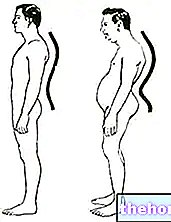Moreover, stress is often due to hectic pace of life, which determine an increase in physical motor activity - especially linked to work and daily activities. In particular if associated with loss of appetite, this increase in calorie consumption very quickly promotes weight loss "idiopathic".
We come to the biochemical aspect of stress. It stimulates the adrenal endocrine glands to release corticosteroids (cortisol, aldosterone, etc.) and catecholamines (adrenaline, noradrenaline). These biochemical messengers mainly have a catabolic and anti-anabolic effect on fat and muscle, and hyperglycemic. They therefore lead to greater demolition than construction, both in muscle mass and adipose tissue, as well as glycogen in the liver.
Therefore, stress in itself "dismantles" the masses, it does not build them. In theory, therefore, stress should facilitate weight loss and not increase, from all points of view; if this were not the case, sports activities with a high energy cost and metabolic effort should make you fat rather than lose weight - we know that it does not that's how it is.
Attention! However, an excess of cortisol can have negative effects on weight loss, which we will not discuss here.
Due to its catabolic impact, chronic stress is nevertheless considered harmful, as it leads to the deterioration and psycho-physical exhaustion of the person. Therefore, in order for an opposite condition to occur, another factor must come into play: the behavioral one.
The human body responds to atavistic laws, built over millennia of evolution in a hostile environment, not to the more modern socio-cultural ones.
Therefore, it would not be stress in itself - even chronic, if associated with a "normocaloric diet - to make you fat; anything else", as we have said, from a biochemical point of view could even make you lose weight. On the contrary, he gets fat "by throwing himself on food", and in particular on foods which are attributed an "anxiolytic" function (crunchy and salty snacks) or "antidepressant" (creamy and sweet, especially chocolate). Note: in reality there is no similar classification, but from a statistical point of view a correlation has been noted between the mood and the choice of food.
To those who were thinking that getting stressed - for example overburdening of commitments - by skipping meals can be a good way to lose weight, remember that in the long run this would lead to wasting, withering, physical and mental exhaustion, lowering of the immune defenses, etc. Without considering the rebound or yo-yo effect, which on the one hand determines the weight gain of the adipose tissue, on the other it does not allow an effective restoration of the muscle mass compromised during the "skinning" caused by fasting and stress.
Paradoxically, those who are psychologically led to a compensatory behavioral attitude benefit more - in terms of weight loss - by reducing general activity rather than increasing it.
If this is not possible, remember that good planning and scheduling of commitments are a real "godsend". Actively carving out the time to eat, the time to sleep, the time to train, the space for social interactions, etc. allows you to "order the" mental agenda ", relieving tension, therefore stress and facilitating the" balance of essential internal feedback. to well-being and general health.




























